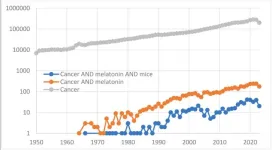(Press-News.org) B cell deficiency is a common condition that can result either from immunosuppressant drugs used to treat autoimmune disease or certain cancers — such as rituximab (RTX) — or from natural immune deficiency. These patients suffer from a weakened immune system that is less effective at combating both viral and bacterial diseases. As B cells are a key type of immune cell that produces antibodies, a deficiency results in a significant decrease in antibody count that can lead to severe disease or death upon infection with SARS-CoV-2.
Researchers at the Ragon Institute of Mass General, MIT, and Harvard; the Massachusetts Institute of Technology; the Koch Institute for Integrative Cancer Research; Monash University; and Mass General Brigham’s founding members, Brigham and Women’s Hospital (BWH) and Massachusetts General Hospital (MGH), have found that vaccination against or infection with SARS-CoV-2 produces a robust T cell response in B cell-deficient patients, providing reassuring evidence for the immunocompromised.
The findings, published recently in Science Translational Medicine, provide key insights regarding SARS-CoV-2 vaccination for patients with B cell deficiency as well as new understanding of immunodeficiency on a broad scale.
“We found that patients who are deficient in B cells, either by treatment or naturally, have T cell responses to SARS-CoV-2 infection or vaccination that were significantly elevated relative to healthy individuals,” says Gaurav Gaiha, MD, DPhil, faculty member at the Ragon Institute, assistant professor of medicine at Harvard Medical School, gastroenterology physician at Massachusetts General Hospital, and senior author of the study. “And in the vaccinated individuals, they had substantially better clinical outcomes even though they lacked anti-spike antibodies.”
Existing studies have previously explored the impact of COVID-19 vaccination in individuals with autoimmune disorders undergoing treatment with specific B cell-depleting antibodies. However, this study was the first to evaluate the impact of B cell deficiency following SARS-CoV-2 infection and to also evaluate the effect of vaccination on clinical outcomes in this immunocompromised population. Findings indicated that individuals with B cell deficiencies, even without detectable anti-spike antibodies, demonstrate heightened CD8 T cell responses to SARS-CoV-2 after prior infection or vaccination. Significantly, these individuals experience markedly reduced rates of hospitalization and moderate and severe COVID-19 after vaccination, despite the absence of detectable anti-spike protein antibodies.
“The question we had when we initiated the study was for these people who don't have B cells, and essentially will not make antibodies to either SARS-CoV-2 infection or vaccination — what's the outcome immunologically, and is there any clinical benefit for these B cell deficient patients to get vaccinated if they're not going to make antibodies?” Gaiha said. “And so I think the key result from our paper is that the answer is yes. Essentially, they should get vaccinated because they have much better clinical outcomes, likely due to these strong T cell responses. I think this study gives important clinical guidance to this particular immunocompromised patient population on this key issue.”
In summary, this research sheds light on the robust immune responses in B cell-deficient individuals following COVID-19 infection or vaccination. These responses, particularly the CD8 T cell reactions, contribute to a decreased risk of severe illness after vaccination, even in the absence of detectable antibodies.
The research was supported by awards from the National Institutes of Health; the Centers for Disease Control and Prevention; the Howard Hughes Medical Institute; the Burroughs Wellcome Fund; Howard M. Goodman Fellowship; the Ragon Institute of Mass General, MIT, and Harvard; the Mark and Lisa Schwartz Foundation and Enid Schwartz; the Lambertus Family Foundation; as well as Sandy and Paul Edgerly. Four authors reported relationships with pharmaceutical companies including AbbVie, Bristol Myers Squibb, Boehringer Ingelheim, Gilead Sciences, Merck, Moderna, and Pfizer.
About the Ragon Institute of Mass General, MIT, and Harvard
The Ragon Institute of Mass General, MIT, and Harvard was established in 2009 with a gift from the Phillip T. and Susan M. Ragon Foundation, with a collaborative scientific mission among these institutions to harness the immune system to combat and cure human diseases. Focusing on diseases of global importance, the Ragon Institute draws scientists, clinicians and engineers from diverse backgrounds and areas of expertise to study and understand the immune system with the goal of benefiting patients. For more information, visit www.ragoninstitute.org.
About Massachusetts General Hospital
Massachusetts General Hospital, founded in 1811, is the original and largest teaching hospital of Harvard Medical School. The Mass General Research Institute conducts the largest hospital-based research program in the nation, with annual research operations of more than $1 billion and comprises more than 9,500 researchers working across more than 30 institutes, centers and departments. In August 2021, Mass General was named #5 in the U.S. News & World Report list of "America’s Best Hospitals." MGH is a founding member of the Mass General Brigham health care system.
END
B cell deficient patients gain protective T cell immunity following SARS-CoV-2 vaccination and infection, study finds
Researchers found that vaccinated B cell-deficient individuals had significantly reduced risk of moderate and severe disease in comparison to those who were not vaccinated, despite an absence of anti-spike antibody responses
2023-12-18
ELSE PRESS RELEASES FROM THIS DATE:
New guidelines released for practitioners treating anaphylaxis and atopic dermatitis
2023-12-18
ARLINGTON HEIGHTS, Ill. – (December 18, 2023) — Two new practice parameters from the Joint Task Force for Practice Parameters (JTFPP) offer evidence-based recommendations for the diagnosis and management of anaphylaxis and atopic dermatitis (AD) in pediatric and adult patients. The Joint Task Force is a partnership between the American College of Allergy, Asthma and Immunology (ACAAI) and the American Academy of Allergy, Asthma and Immunology.
“Both anaphylaxis and atopic dermatitis are allergic conditions that affect millions of people – in the United States and around the world,” says allergist Jay Lieberman, MD, co-chair of the JTFPP ...
Spike in dermatology visits for skin problems seen during summer of wildfires
2023-12-18
New research suggests that air pollution may contribute to the development or worsening of skin conditions.
The work, which is published in Dermatology and Therapy and led by scientists at Massachusetts General Hospital (MGH), a founding member of the Mass General Brigham healthcare system, points to the need to improve air quality to lower the burden of skin disease, especially for vulnerable communities.
“We were inspired to investigate the relationship between air pollution and skin inflammation after listening to patients who kept telling us that their skin conditions like eczema were particularly bad, and in some cases ‘worse than ever before,’ this summer,” ...
Melatonin and carcinogenesis in mice: The 50th anniversary of relationships
2023-12-18
“[...] murine models proved to be valuable and, in some cases, indispensable for advancing melatonin applications in oncology [...].”
BUFFALO, NY- December 18, 2023 – A new research perspective was published in Oncotarget's Volume 14 on December 12, 2023, entitled, “Melatonin and carcinogenesis in mice: the 50th anniversary of relationships.”
Fifty years ago, in 1973, Vladimir N. Anisimov and coauthors demonstrated for the first time an inhibitory effect of the pineal ...
Yale study finds “Forever chemicals” promote cancer migration
2023-12-18
New Haven, Conn. — In a new study by researchers at the Yale School of Public Health, two “forever chemicals” spurred cancer cells in the lab to migrate to new positions, an indication that the chemicals could contribute to cancer metastasis in living organisms.
The study addressed the group of industrial chemicals called per- and polyfluoroalkyl substances (PFAS). The substances are known as “forever chemicals” because they don’t break down in the environment and can build up in the human body. They have the ability to shed water and resist penetration by oils. They are ...
New survey: 79% of survey respondents overlook their health needs during the holidays; find the holidays more stressful than tax season
2023-12-18
Survey Highlights:
A majority of Americans (51%) say it takes them weeks to feel less stressed after the holidays, with more than a quarter of moms reporting it takes them a month or more to recover.
71% of respondents say that their biggest regret after the holidays is that they did not take the time to relax and enjoy the season.
Overall, respondents (63%) claimed that the holiday season is more stressful than tax season.
Eating healthy (69%), exercising regularly (64%), and getting enough sleep (56%) are the top three things that respondents have trouble prioritizing during the holiday season.
79% of people surveyed agree that, during the holidays, they are so focused on creating special ...
Public opinion polls may not be as straightforward as you think
2023-12-18
Public opinion polls are often considered "the will of the people" but a new study on the role of polls in South Korea shows that they may not always be that transparent.
"Using polls to gauge what people think about politics is not as simple as it sounds, as there are multiple mediating factors between what people think and how their views may be represented in the media," says co-author Sunmin Kim, an assistant professor of sociology at Dartmouth. "Our research shows more broadly, how in a democracy, measuring what people think or want can be a highly haphazard and unpredictable process based on the ways public opinion poll ...
Study assesses GPT-4’s potential to perpetuate racial, gender biases in clinical decision making
2023-12-18
A team of Brigham researchers analyzed GPT-4’s performance in four clinical decision support scenarios: generating clinical vignettes, diagnostic reasoning, clinical plan generation and subjective patient assessments.
When prompted to generate clinical vignettes for medical education, GPT-4 failed to model the demographic diversity of medical conditions, exaggerating known demographic prevalence differences in 89% of diseases.
When evaluating patient perception, GPT-4 produced significantly different responses by gender or race/ethnicity for 23% of cases.
Large language models (LLMs) like ChatGPT and GPT-4 have the potential to assist in ...
Apes remember friends they haven’t seen for decades
2023-12-18
Apes recognize photos of groupmates they haven’t seen for more than 25 years and respond even more enthusiastically to pictures of their friends, a new study finds.
The work, which demonstrates the longest-lasting social memory ever documented outside of humans, and underscores how human culture evolved from the common ancestors we share with apes, our closest relatives, was published today in the journal Proceedings of the National Academy of Sciences.
“Chimpanzees and bonobos recognize individuals even though they haven’t seen them for ...
Scientists might be using a flawed strategy to predict how species will fare under climate change
2023-12-18
EMBARGO LIFTS DEC. 18, 2023, AT 3:00 PM U.S. EASTERN TIME
As the world heats up, and the climate shifts, life will migrate, adapt or go extinct. For decades, scientists have deployed a specific method to predict how a species will fare during this time of great change. But according to new research, that method might be producing results that are misleading or wrong.
University of Arizona researchers and their team members at the U.S. Forest Service and Brown University found that the method – commonly referred to as space-for-time substitution – failed to accurately predict how a widespread tree of the Western U.S. called the ...
Mesopotamian bricks unveil the strength of Earth’s ancient magnetic field
2023-12-18
Ancient bricks inscribed with the names of Mesopotamian kings have yielded important insights into a mysterious anomaly in Earth’s magnetic field 3,000 years ago, according to a new study involving UCL researchers.
The research, published in the Proceedings of the National Academy of Sciences (PNAS), describes how changes in the Earth’s magnetic field imprinted on iron oxide grains within ancient clay bricks, and how scientists were able to reconstruct these changes from the names of the kings inscribed on the bricks.
The team hopes that using this “archaeomagnetism,” which looks for signatures ...
LAST 30 PRESS RELEASES:
Spiritual practices strongly associated with reduced risk for hazardous alcohol and drug use
Novel vaccine protects against C. diff disease and recurrence
An “electrical” circadian clock balances growth between shoots and roots
Largest study of rare skin cancer in Mexican patients shows its more complex than previously thought
Colonists dredged away Sydney’s natural oyster reefs. Now science knows how best to restore them.
Joint and independent associations of gestational diabetes and depression with childhood obesity
Spirituality and harmful or hazardous alcohol and other drug use
New plastic material could solve energy storage challenge, researchers report
Mapping protein production in brain cells yields new insights for brain disease
Exposing a hidden anchor for HIV replication
Can Europe be climate-neutral by 2050? New monitor tracks the pace of the energy transition
Major heart attack study reveals ‘survival paradox’: Frail men at higher risk of death than women despite better treatment
Medicare patients get different stroke care depending on plan, analysis reveals
Polyploidy-induced senescence may drive aging, tissue repair, and cancer risk
Study shows that treating patients with lifestyle medicine may help reduce clinician burnout
Experimental and numerical framework for acoustic streaming prediction in mid-air phased arrays
Ancestral motif enables broad DNA binding by NIN, a master regulator of rhizobial symbiosis
Macrophage immune cells need constant reminders to retain memories of prior infections
Ultra-endurance running may accelerate aging and breakdown of red blood cells
Ancient mind-body practice proven to lower blood pressure in clinical trial
SwRI to create advanced Product Lifecycle Management system for the Air Force
Natural selection operates on multiple levels, comprehensive review of scientific studies shows
Developing a national research program on liquid metals for fusion
AI-powered ECG could help guide lifelong heart monitoring for patients with repaired tetralogy of fallot
Global shark bites return to average in 2025, with a smaller proportion in the United States
Millions are unaware of heart risks that don’t start in the heart
What freezing plants in blocks of ice can tell us about the future of Svalbard’s plant communities
A new vascularized tissueoid-on-a-chip model for liver regeneration and transplant rejection
Augmented reality menus may help restaurants attract more customers, improve brand perceptions
Power grids to epidemics: study shows small patterns trigger systemic failures
[Press-News.org] B cell deficient patients gain protective T cell immunity following SARS-CoV-2 vaccination and infection, study findsResearchers found that vaccinated B cell-deficient individuals had significantly reduced risk of moderate and severe disease in comparison to those who were not vaccinated, despite an absence of anti-spike antibody responses



